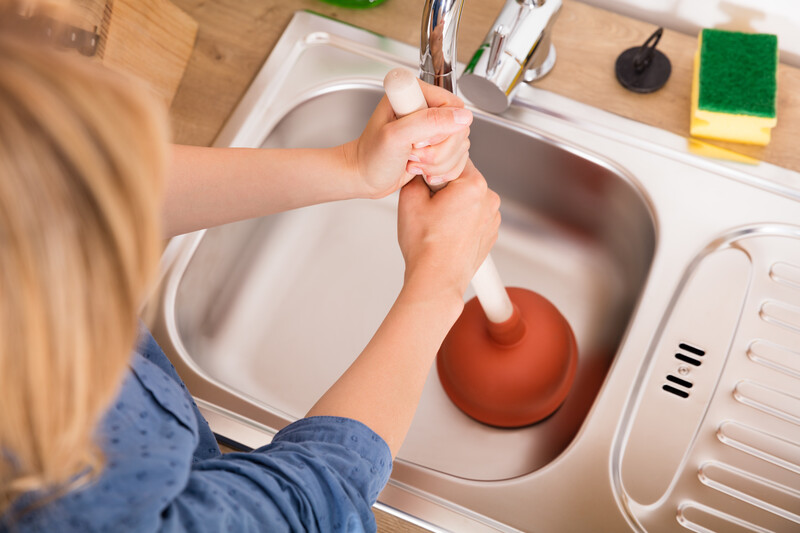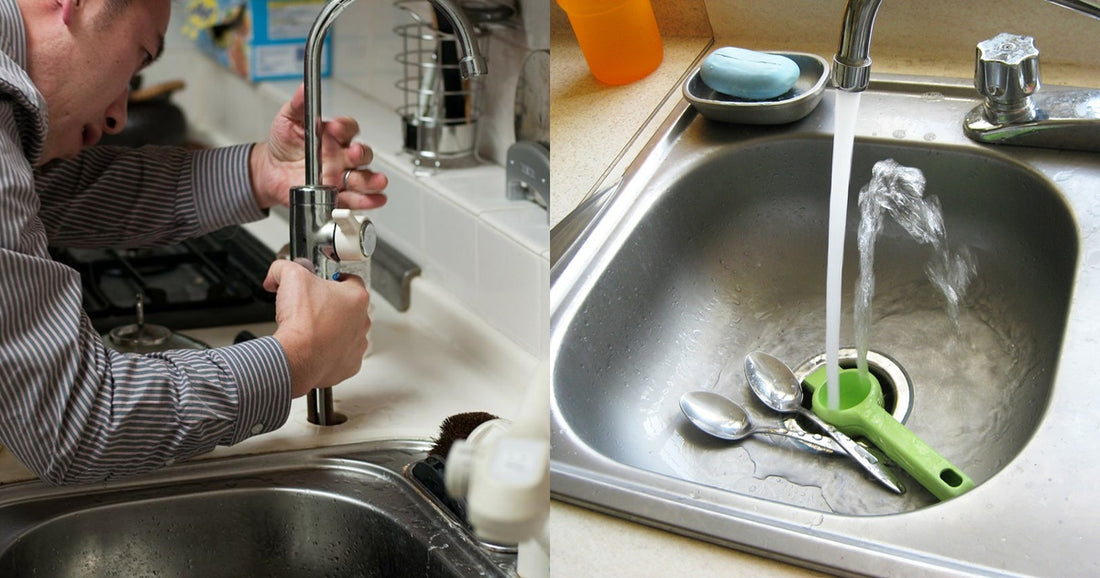Straightforward Methods To Fix A Slow-Draining Sink
Straightforward Methods To Fix A Slow-Draining Sink
Blog Article
They are making a number of good annotation on 7 Ways To Fix A Slow-Draining Sink Before You Call A Plumber overall in this content on the next paragraphs.

Intro
We've all existed: You're brushing your teeth or washing your hands, and you observe the water pooling in the sink. Rather than promptly swirling down the tubes, it sticks around, transforming your once-refreshing early morning routine right into a small swamp scene. A slow-draining sink isn't simply frustrating; it's frequently an indication of larger plumbing problems prowling beneath the surface. Fortunately is that the majority of slow-draining sinks can be fixed with a little expertise, a couple of standard devices, and some patience. Ready to tackle this project head-on? Allow's roll up our sleeves and dive right in.
Recognizing the Sources Of a Slow-Draining Sink
Prior to you begin poking around in your pipelines, it assists to know what may be causing the slowdown. Understanding the root cause makes it simpler to pick the ideal repair.
Tools and Products You'll Need
The right tools make all the distinction. Thankfully, you won't require a completely stocked plumbing technician's van to finish the job.
Step-by-Step Guide to Taking Care Of a Slow-Draining Sink
Now, let's get involved in the nitty-gritty. This step-by-step process will certainly direct you via easy strategies to restore your sink's drainage.
Action 1: Get Rid Of and Clean the Stopper
Usually, the stopper (that small plug you lower to obstruct water) is the initial offender. Remove it meticulously and clean off any type of hair or gunk caught around its base. Wash it completely prior to placing it back in place.
Step 2: Make Use Of a Bettor to Dislodge Particles
Got that bettor all set? Setting it over the drain and give it a few company pumps. The concept is to develop suction that can loosen up any kind of obstruction. If you see bits of debris drifting up, you're on the ideal track.
Action 3: Try a Drain Snake or Cable Hanger
If the plunger doesn't do the trick, it's time to draw out the drain snake. Carefully feed it right into the drain and twist as you go. You may feel some resistance-- that's most likely the blockage. Maintain turning and pulling up until you get rid of the obstruction. If you do not have a drainpipe snake, a straightened out cable hanger can operate in a pinch.
Tip 4: Apply a DIY Drainpipe Cleaner
A natural cleaner made from baking soft drink and vinegar can break down recurring gunk. Put half a cup of baking soft drink right into the drainpipe, followed by half a mug of vinegar. Allow it fizz for about 15 mins, then flush with warm water. This chemical reaction usually does wonders for minor blockages.
Tip 5: Rebuild and Test the Sink
Put whatever back with each other and run the tap. Does the water now swirl down the tubes at a reputable speed? If yes, provide yourself a pat on the back. If not, do not misery-- there are still a couple of more dress up your sleeve.
Crucial Devices for Do It Yourself Repair Works
A bettor is your best starting factor. A tiny, sink-sized bettor develops suction that can displace minor obstructions. For more relentless clogs, a drain serpent (occasionally called a plumbing professional's auger) functions marvels. A set of gloves, a flashlight, and perhaps a set of protective safety glasses are also handy.
Suggested Cleansing Solutions
Mild meal soap and warm water can assist break down oily build-up. A blend of cooking soft drink and vinegar is a time-tested natural home remedy, and chemical cleaners use an even more green method. Keep chemical drain cleansers as a last option, as they can be extreme on your pipelines.
Typical Wrongdoers Behind Slow Water Drainage
So, what's obstructing things up? Commonly, it's a combination of daily particles-- believe hair, soap scum, tooth paste deposit, and leftover food particles. With time, these little bits build up and hold on to the pipe walls, gradually tightening the passage and making it harder for water to pass through. Sometimes, mineral deposits from tough water can likewise include in the crud, producing the ideal tornado for persistent clogs.
When is it Time to Do Something About It?
If you see the water draining slower than usual, it's an excellent idea to step in quicker rather than later on. Waiting as well long can cause finish blockages, unpleasant smells, or even pipeline damage. If the water takes more than a few secs to remove after turning off the tap, consider it a warning and get ready to put on your do it yourself hat.
Safety And Security First: Precautions and Prep work
Before you launch into unclogging mode, consider safety. You're handling possibly filthy water and debris, so slip on a set of handwear covers. If you're using chemical cleansers, make certain the area is well-ventilated and adhere to the guidelines on the label.
Protective Equipment and Office Configuration
Lay down some old towels or dustcloths around the sink location to catch sprinkles. Remove any type of things that may enter your method, like soap dispensers or toothbrush owners. See to it you have excellent illumination-- grab a flashlight if needed.
Alternate Techniques for Stubborn Clogs
Not all clogs are developed equal. If your sink still refuses to coordinate, think about these alternate solutions.
Sodium Bicarbonate and Vinegar Technique
We already touched on this, however it deserves noting again. This mild, eco-friendly technique is safer than chemical cleansers and typically rather reliable.
Chemical Drain Cleansers
Enzyme-based cleaners make use of all-natural germs to digest raw material. They're a superb choice if you're aiming to prevent rough chemicals. Simply bear in mind, they might take a bit longer to work their magic.
Chemical Drainpipe Cleaning Company: Benefits And Drawbacks
Chemical cleaners can blow up via difficult obstructions fast, however they're not without downsides. They can create warmth and fumes, damages pipelines if made use of exceedingly, and pose ecological risks. Use them sparingly, and constantly adhere to the instructions meticulously.
Safety Nets to Keep Your Sink Flowing
Avoidance is the best treatment. By embracing a few basic practices, you can keep your sink from reducing to begin with.
Routine Cleansing Habits
Clean down the sink basin and component location regularly. Remove hair or food particles before they have an opportunity to wash down the drainpipe.
Staying Clear Of Hazardous Compounds Down the Drain
Reconsider before unloading coffee premises, grease, or fibrous vegetable scraps down the sink. These perpetrators cling to pipe walls, producing obstructions gradually.
Routine Upkeep Checks
Schedule a fast monthly assessment. Run warm water with the sink for a few minutes, taking notice of the circulation. If it appears slow-moving, act quick prior to it ends up being a full-on obstruction.
When to Call a Specialist Plumbing
Sometimes, despite just how tough you attempt, that block just will not move. That's when it's time to generate the pros.
Signs That Indicate a More Severe Concern
If your sink drains slowly regardless of multiple attempts, or if you discover water supporting in various other fixtures (like your shower or commode), you may have a much more serious plumbing concern lurking deeper in the system.
Stabilizing DIY Initiatives with Specialist Help
While do it yourself can conserve you money and supply a feeling of success, there's no pity in calling a specialist. A professional plumbing can analyze your whole plumbing arrangement, making certain there's no underlying damages or lasting trouble that might cost you a lot more later on.
Comparing Expenses and Long-Term Solutions
Prior to choosing, take into consideration the big picture. An affordable, quick fix may fix the problem temporarily, but purchasing an extra irreversible option could conserve you cash and tension in the long run.
Weighing the Expenses of Do It Yourself vs. Expert Fixes
DIY fixes typically cost little greater than the rate of a plunger or a bottle of baking soft drink. Specialist solutions, on the other hand, featured a price tag but may prevent repetitive problems and costly repairs later.
Investing in Top Quality Fixtures and Upgrades
If your sink's design adds to frequent clogs, it may be worth updating to higher-quality components or altering the plumbing format. Consider this a financial investment in your house's capability and comfort.
Final thought
A slow-draining sink can seem like a small irritability, however it's typically an indication that your plumbing requires a little tender loving care. By understanding the source, utilizing the right devices and strategies, and devoting to straightforward preventive measures, you can keep your sink flowing easily. And when all else stops working, never hesitate to call in a specialist-- your home's plumbing deserves the investment in treatment and upkeep.
Three Common Ways to Fix a Slow Drain
Baking Soda Method
Boil a full pot of water. Measure out cup of baking soda and pour it down the drain. Then take cup of the magical cleansing substance known as white vinegar and drop that down there too. Allow the mixture to fizz in the drain for five minutes as the vinegar and baking soda combine. Now dump in that whole pot of boiling water. This combination of cleaning substances should clear out anything that is causing your sink to drain slowly. If it doesn t...
Zip-It
If the baking soda method doesn t clear out your drain, it may be because a significant amount of hair and/or other debris has collected there and you need to remove it. Purchase a Zip-It tool at any home improvement or hardware store and insert it into your drain. It will catch any collected hair or debris that s blocking the flow of water. Pull it out. If it s got a big clump of hair, etc. on the end, you ve probably got your culprit.
Drain Cleaner
If these methods don t work, there is the standard drain cleaner that you can also buy in a hardware store or even your local grocery store. It s better if you can use a household solution, but these drain cleaners often work in a pinch. They re very simple to use. You generally just dump them in your drain and wait. If even this method is not effective, it may be time to call the plumber.
https://www.mrrooter.com/oneida/about-us/blog/2017/july/three-common-ways-to-fix-a-slow-drain/

I recently found that review about Solved! How to Fix a Slow Sink Drain while doing a lookup on the search engines. In case you enjoyed reading our blog posting plz consider to pass it around. We treasure reading our article about Solved! How to Fix a Slow Sink Drain.
Quote & Schedule Report this page